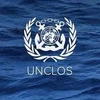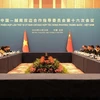Deputy Foreign Minister Ho Xuan Son has stressed the significance of the 1982 United Nations Convention on the Law of the Sea (UNCLOS) in an article on the occasion of the convention’s 30 th anniversary, which falls on Dec. 10.
Vietnam was among 107 countries that signed the convention right on the day it was opened for signing. “By adopting the 1982 UNCLOS, the Socialist Republic of Vietnam will, together with countries concerned, build an equitable legal order and encourage the global development and cooperation in the sea,” the Vietnamese National Assembly says in its resolution ratifying the convention on June 23, 1994 .
Deputy Minister Son, who is also Chairman of the Foreign Ministry’s National Boundary Commission, affirmed that the convention’s membership is of great significance to Vietnam, as it is an international legal foundation recognizing that the country is entitled to 12 nautical miles of territorial waters, an exclusive economic zone 200 nautical miles wide and a continental shelf of at least 200 nautical miles which can be extended to 350 nautical miles as measured from the baseline.
The document also serves as the international legal foundation for the demarcation of overlapping sea areas between Vietnam and other East Sea countries, contributing to creating an environment of stability, peace, cooperation and development in the region. Based on the Convention, Vietnam conducted negotiations and demarcated maritime boundary with Thailand in 1997, delimited the boundary in territorial waters, exclusive economic zones and continental shelves in the Gulf of Tonkin with China in 2000 and demarcated the boundary on the continental shelf with Indonesia in 2003.
Eighteen years after ratifying the convention, the Vietnamese legislature, 13 th tenure, passed the Law of the Sea of Vietnam at its third session on June 21, 2012 . For the first time in history, Vietnam ’s Law of the Sea has fully stipulated the legal status of seas and islands belonging to Vietnam ’s sovereignty, sovereignty right and jurisdiction in line with the contents of UNCLOS 1982.
The Law of the Sea of Vietnam provides an important foundation for the uniform management, use, protection and development of the marine-based economy.
The adoption of the law has shown to the world that Vietnam is a responsible member of the international community, always abides by and respects international law. It also demonstrates the Vietnamese State ’s determination in striving for peace, stability, cooperation and development in the region and the world.
Amid the complicated changes in the East Sea in recent years, the Vietnamese Party and State follow the policy of respecting and abiding to the Convention, using it to settle disputes in the East Sea by peaceful means on the basis of respecting independence, sovereignty and territorial integrity as well as interests of related nations.
While seeking a basic long-term solution to the East Sea issue, concerned parties need to restrain themselves and refrain from any move that can further complicate the issue, in line with the Convention’s stipulation.
Deputy Minister Son reiterated that Vietnam pursues a consistent foreign policy of independence, self-control, diversification and multilateralisation of relations, defending sovereignty over seas and islands by collective power and persistently trying to settle the East Sea dispute and emerging issues at sea by peaceful means in line with international law, especially the 1982 UNCLOS.
Vietnam has been and is demonstrating that it is a responsible member of the Convention, while actively applying the document to establish an equitable legal order to ensure legitimate rights and interests of countries, he said.
The UNCLOS marked the success of the third UN Conference on the Law of the Sea in Montego Bay , Jamaica , 30 years ago.
Come into force since November 16, 1994 , the Convention is a massive multilateral document with 320 articles and 9 annexes. It has by far become one of the most important and popular international treaties in the 20 th century with 164 member nations.
The Convention covers all issues related to territorial waters of coastal countries as well as the use and exploitation of international waters and ocean beds.
Major features included in the document are legal status of waters belonging to national sovereignty, sovereignty rights and jurisdiction rights, including internal and territorial waters, contiguous zones, exclusive economic zone and continental shelf.
It also details legal regime of international waters and ocean beds – common heritage of the mankind, the use and management of marine resources both living and non-living resources, the protection of marine environment, marine scientific research, security and order, the settlement of disputes, international cooperation, and working regulations of the International Seabed Authority, the Commission on the Limits of the Continental Shelf, the International Tribunal for the Law of the Sea and the Meetings of State Parties.
Referred to as a Constitution for the Oceans, regulations of the Convention are outcomes of cooperation, struggle, compromise and construction throughout many years between countries all over the world with different socio-economic regimes, economic backgrounds and legal perspectives.-VNA
Vietnam was among 107 countries that signed the convention right on the day it was opened for signing. “By adopting the 1982 UNCLOS, the Socialist Republic of Vietnam will, together with countries concerned, build an equitable legal order and encourage the global development and cooperation in the sea,” the Vietnamese National Assembly says in its resolution ratifying the convention on June 23, 1994 .
Deputy Minister Son, who is also Chairman of the Foreign Ministry’s National Boundary Commission, affirmed that the convention’s membership is of great significance to Vietnam, as it is an international legal foundation recognizing that the country is entitled to 12 nautical miles of territorial waters, an exclusive economic zone 200 nautical miles wide and a continental shelf of at least 200 nautical miles which can be extended to 350 nautical miles as measured from the baseline.
The document also serves as the international legal foundation for the demarcation of overlapping sea areas between Vietnam and other East Sea countries, contributing to creating an environment of stability, peace, cooperation and development in the region. Based on the Convention, Vietnam conducted negotiations and demarcated maritime boundary with Thailand in 1997, delimited the boundary in territorial waters, exclusive economic zones and continental shelves in the Gulf of Tonkin with China in 2000 and demarcated the boundary on the continental shelf with Indonesia in 2003.
Eighteen years after ratifying the convention, the Vietnamese legislature, 13 th tenure, passed the Law of the Sea of Vietnam at its third session on June 21, 2012 . For the first time in history, Vietnam ’s Law of the Sea has fully stipulated the legal status of seas and islands belonging to Vietnam ’s sovereignty, sovereignty right and jurisdiction in line with the contents of UNCLOS 1982.
The Law of the Sea of Vietnam provides an important foundation for the uniform management, use, protection and development of the marine-based economy.
The adoption of the law has shown to the world that Vietnam is a responsible member of the international community, always abides by and respects international law. It also demonstrates the Vietnamese State ’s determination in striving for peace, stability, cooperation and development in the region and the world.
Amid the complicated changes in the East Sea in recent years, the Vietnamese Party and State follow the policy of respecting and abiding to the Convention, using it to settle disputes in the East Sea by peaceful means on the basis of respecting independence, sovereignty and territorial integrity as well as interests of related nations.
While seeking a basic long-term solution to the East Sea issue, concerned parties need to restrain themselves and refrain from any move that can further complicate the issue, in line with the Convention’s stipulation.
Deputy Minister Son reiterated that Vietnam pursues a consistent foreign policy of independence, self-control, diversification and multilateralisation of relations, defending sovereignty over seas and islands by collective power and persistently trying to settle the East Sea dispute and emerging issues at sea by peaceful means in line with international law, especially the 1982 UNCLOS.
Vietnam has been and is demonstrating that it is a responsible member of the Convention, while actively applying the document to establish an equitable legal order to ensure legitimate rights and interests of countries, he said.
The UNCLOS marked the success of the third UN Conference on the Law of the Sea in Montego Bay , Jamaica , 30 years ago.
Come into force since November 16, 1994 , the Convention is a massive multilateral document with 320 articles and 9 annexes. It has by far become one of the most important and popular international treaties in the 20 th century with 164 member nations.
The Convention covers all issues related to territorial waters of coastal countries as well as the use and exploitation of international waters and ocean beds.
Major features included in the document are legal status of waters belonging to national sovereignty, sovereignty rights and jurisdiction rights, including internal and territorial waters, contiguous zones, exclusive economic zone and continental shelf.
It also details legal regime of international waters and ocean beds – common heritage of the mankind, the use and management of marine resources both living and non-living resources, the protection of marine environment, marine scientific research, security and order, the settlement of disputes, international cooperation, and working regulations of the International Seabed Authority, the Commission on the Limits of the Continental Shelf, the International Tribunal for the Law of the Sea and the Meetings of State Parties.
Referred to as a Constitution for the Oceans, regulations of the Convention are outcomes of cooperation, struggle, compromise and construction throughout many years between countries all over the world with different socio-economic regimes, economic backgrounds and legal perspectives.-VNA



















